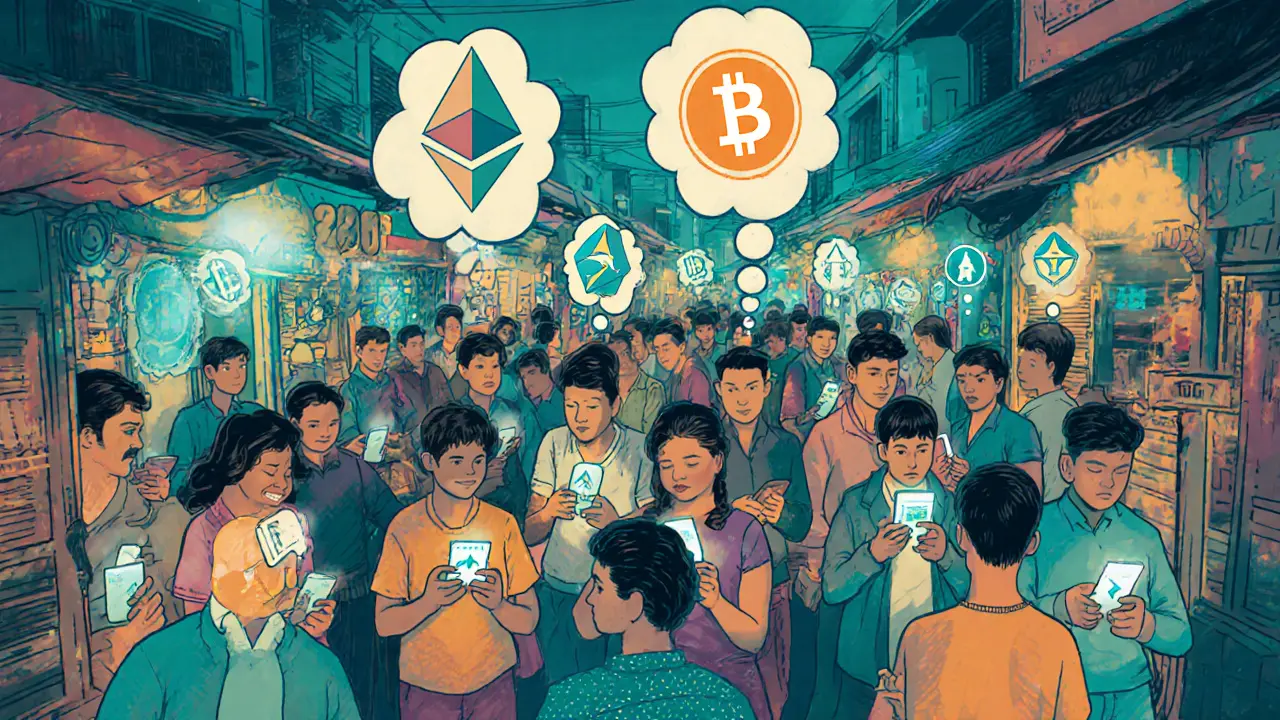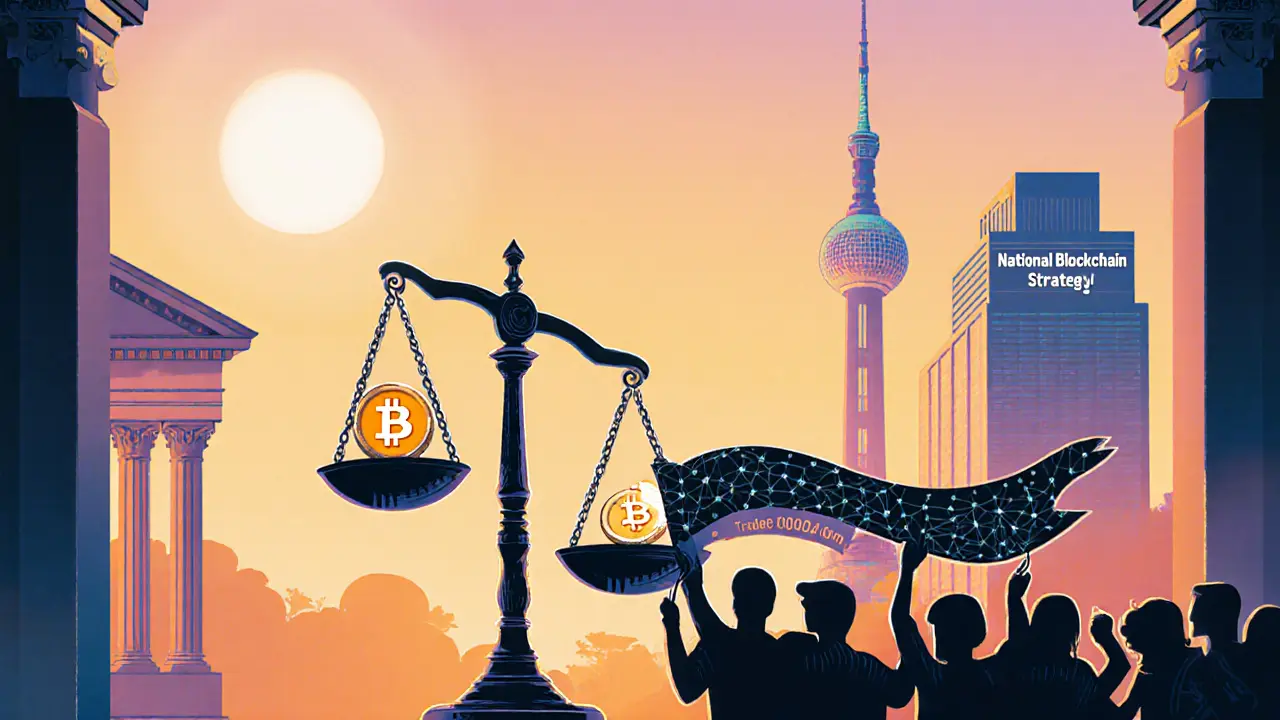600,000 Bangladeshis Trade on Binance Despite Crypto Ban

Bangladesh Crypto Risk Evaluator
Enter your trading details and click "Evaluate Risk Level" to see your risk assessment.
When you hear that over Binance is a global cryptocurrency exchange that lets anyone buy, sell and trade digital assets, you might think it’s just another fintech story. Binance connects users to a massive market of Bitcoin, Ethereum, Tether and hundreds of other tokens. In Bangladesh, where the government has kept a strict Bangladesh crypto ban for years, more than 600,000 locals are still logging in to the platform every day, carving out a hidden economy that flies under the radar of regulators.
Key Takeaways
- Bangladesh ranks among only ten countries with a total cryptocurrency ban, yet an estimated 600,000 citizens use Binance.
- The ban is enforced through existing financial laws, not a dedicated crypto statute.
- Users rely on card purchases, local agents and app‑store availability to bypass restrictions.
- Legal risks include violations of the Foreign Exchange Regulation Act (1947) and the Money Laundering Prevention Act (2012).
- Experts argue that regulation, not prohibition, is the pragmatic path forward.
Bangladesh’s Crypto Prohibition Landscape
The country's stance on digital currencies is built on a patchwork of older financial regulations. The central authority, Bangladesh Bank the nation’s central bank that oversees monetary policy and banking supervision, issued its first public warning about Bitcoin in 2014, followed by a 2016 advisory that warned of potential breaches of two key statutes:
- The Foreign Exchange Regulation Act a 1947 law governing foreign currency transactions, which does not recognize crypto as legal tender.
- The Money Laundering Prevention Act a 2012 anti‑money‑laundering framework, under which virtual‑currency trades are deemed suspicious.
Despite these warnings, the government never passed a dedicated crypto‑ban bill. Instead, it relies on the existing financial architecture to label crypto activity as illegal, creating a gray zone that fuels underground markets.
How 600,000+ Bangladeshis Reach Binance
Getting on Binance from a country that officially outlaws crypto involves a mix of tech workarounds and local networks:
- Card‑based purchases: Some users link foreign‑issued credit or debit cards to Binance, converting Bangladeshi Taka (BDT) into US dollars (USD) before the transaction lands on the exchange. Banks can flag these moves, but many slip through due to limited monitoring.
- Local agents: A thriving network of traders buys Bitcoin or Tether from overseas and sells it for BDT in person, usually for a 1‑2% commission. Agents act as custodians, holding the crypto in their own wallets and transferring ownership via private keys.
- App‑store accessibility: Both Google Play and Apple’s App Store still list Binance’s mobile app for Bangladeshi users. The lack of a nationwide block means anyone with a smartphone can download and start trading in minutes.
- VPN usage: A growing number of traders use virtual private networks to mask their IP address, making it harder for authorities to detect the country of origin.
These methods illustrate a sophisticated ecosystem that balances convenience with risk mitigation. While the central bank warns that such activity may breach AML and terrorism‑financing laws, enforcement remains uneven.

Legal and Compliance Risks
Anyone participating in the underground market faces several tangible dangers:
- Criminal liability: Under the Foreign Exchange Regulation Act, using crypto to settle foreign‑exchange transactions is a direct violation that can lead to fines or imprisonment.
- Anti‑money‑laundering scrutiny: The Financial Intelligence Unit (FIU) monitors large, suspicious transfers. Crypto trades that bypass banking channels often attract heightened attention.
- Tax uncertainty: Bangladesh’s National Board of Revenue treats crypto gains under the general Income Tax Ordinance of 1984, meaning profits are taxable even though there is no specific crypto tax code.
- Account freezes: Banks have been known to close accounts linked to repeated crypto‑related transactions, cutting off users from the formal financial system.
These risks create a chilling effect for businesses that need reliable cross‑border payment channels, pushing them to rely on more expensive, slower traditional banking routes.
Expert Viewpoint: Regulation Over Prohibition
Academic voices in Bangladesh argue that a total ban is counterproductive. Dr. B M Mainul Hossain Professor at Dhaka University, director of its Institute of Information Technology has publicly stated, “Banning is not a solution. Sitting back and doing nothing is not the answer.” He calls for a transparent framework where identity verification is required, but the technology itself is not outlawed.
Hossain points out that the 2020 National Blockchain Strategy a government plan that earmarks blockchain for digital transformation already acknowledges the potential of distributed ledgers. Yet, the same policy treats cryptocurrencies as a separate, risky asset class that should remain prohibited. The disconnect fuels debate among policymakers, fintech entrepreneurs, and civil society groups.
Regional Context: How Bangladesh Compares
| Country | Primary Legal Basis | Enforcement Mechanism |
|---|---|---|
| Bangladesh | Foreign Exchange Regulation Act (1947) & Money Laundering Prevention Act (2012) | Banking warnings, FIU monitoring |
| China | People’s Bank of China directives | Internet shutdowns, exchange closures |
| Egypt | Central Bank circulars | Bank account freezes |
| Nepal | Financial Institutions Act | Legal prosecutions |
| Morocco | d>Foreign Exchange Office bans | Regulatory penalties |
| Afghanistan | Central Bank notices | Enforcement by law enforcement |
| Algeria | Financial Law amendment 2018 | Bank monitoring |
| Bolivia | Central Bank ordinance | Banking sector enforcement |
| Tunisia | Financial law updates | FIU oversight |
| Iraq | Central Bank directives | Bank account restrictions |
While Bangladesh’s approach mirrors these nations in its absolute stance, the scale of underground participation is noteworthy. Countries like Nigeria and Vietnam see similar hidden markets, but they have started easing banking restrictions, hinting at a possible policy shift.
Future Outlook: Will the Ban Hold?
Several forces could push Bangladesh toward a softer regulatory regime:
- International pressure: Global financial institutions are urging clear crypto‑regulation to combat illicit finance.
- Economic incentives: A legitimate crypto market could attract foreign investment and remittances, crucial for a country with a large diaspora.
- Domestic demand: The sustained 600,000+ user base proves that a total ban does not eliminate demand.
- Policy signals: The 2020 National Blockchain Strategy shows the government is comfortable with the underlying technology, if not the assets.
Until the authorities provide a clear, workable framework, traders will likely continue using the same workarounds-VPNs, agents, and offshore cards-to access Binance and other exchanges. The ecosystem will remain a shadow market, but its persistence may eventually force lawmakers to rethink the outright prohibition.

Frequently Asked Questions
Is using Binance illegal in Bangladesh?
Bangladesh’s central bank and the Financial Intelligence Unit treat any crypto‑related trading, holding or facilitation as a violation of the Foreign Exchange Regulation Act and the Money Laundering Prevention Act. While there is no specific criminal code that names Binance, using the platform to trade cryptocurrency can be prosecuted under those broader financial laws.
How do Bangladeshi traders avoid detection?
Most rely on a mix of local agents who exchange BDT for crypto, VPN services that hide their IP address, and foreign‑issued cards that process payments in USD. The Binance mobile app remains available in standard app stores, so many simply download it and trade without flagging any local network filters.
What are the tax implications for crypto gains?
Bangladesh does not have a dedicated crypto tax, but gains are treated as ordinary income under the Income Tax Ordinance of 1984. Traders are expected to declare profits on their annual returns, and failure to do so can attract penalties from the National Board of Revenue.
Can the government block Binance’s app?
Technically it can request removal from app stores or enforce ISP-level blocks, but doing so requires coordination across multiple agencies and has not been fully implemented. The persistence of the app in both Google Play and the Apple Store shows that enforcement is limited.
What alternatives exist for Bangladeshi users?
Some turn to peer‑to‑peer platforms that operate on decentralized exchanges, while others use regional exchanges in India or Malaysia that accept fiat deposits. All alternatives carry similar legal risks because the ban applies to any crypto activity, not just specific platforms.

21 Comments
It's no surprise that a regime that constantly monitors communications would resort to a blanket ban, yet the populace finds a way to circumvent it. Behind every VPN connection lies a network of shadow brokers feeding the hunger for financial freedom. The state claims to protect us from financial chaos, but in reality they’re just terrified of losing control over capital flows. Every hidden transaction is a silent protest against an overreaching authority. The truth is that secrecy breeds distrust, and the ban only fuels the very thing it seeks to eliminate.
Nice theory, but reality is simpler.
One might contemplate the ontological ramifications of a state-imposed prohibition on a technology inherently decentralized, thereby challenging the very notion of sovereignty in the digital age.
In examining the socio-economic dimensions, we observe a paradox wherein the suppression of an emancipatory tool engenders a clandestine market that flourishes under the veil of regulatory oblivion.
The interplay between legal frameworks such as the Foreign Exchange Regulation Act and the emergent crypto economy illustrates a discordance between statutory antiquity and contemporary financial innovation.
Moreover, the reliance on foreign-issued cards and virtual private networks epitomizes a transnational diffusion of capital, circumventing national monetary controls in a manner reminiscent of historic arbitrage practices.
From a jurisprudential perspective, the categorization of cryptocurrency transactions as violations under the Money Laundering Prevention Act raises epistemological questions about the definition of 'money' itself.
Is the state merely attempting to preserve the hegemony of fiat currency, or does it genuinely fear illicit activities concealed within blockchain anonymity?
The proliferation of local agents acting as custodians exemplifies a hybrid model of informal intermediation, blurring the lines between legitimate financial intermediation and illicit facilitation.
In this context, the risk assessment models deployed by regulatory bodies may suffer from algorithmic myopia, failing to capture the nuanced risk vectors inherent in a decentralized ecosystem.
The psychological impetus for individuals to engage in such activities can be traced to a desire for financial autonomy, a sentiment amplified by diaspora remittance pressures.
Contrasting Bangladesh's stance with that of neighboring economies reveals a spectrum of regulatory approaches, ranging from outright prohibition to gradual integration, each yielding distinct market outcomes.
The endemic persistence of over six hundred thousand traders signals a market inefficiency that, if harnessed appropriately, could catalyze fiscal inclusion and technological advancement.
Yet the specter of punitive enforcement looms, wherein violations may culminate in criminal prosecution, thereby imposing a chilling effect on nascent fintech entrepreneurship.
Consequently, a nuanced policy framework that reconciles regulatory oversight with innovation incentives may present a more pragmatic solution than blanket bans.
In summation, the juxtaposition of legal rigidity against adaptive market behavior underscores the futility of attempting to outlaw an inherently borderless technology, prompting a reevaluation of governance paradigms in the digital epoch. 🙂
It's truly astounding how a country that proudly proclaims its economic resilience can’t seem to handle a few million of its citizens simply wanting to trade a digital asset that has been around for well over a decade, especially when the same government that touts its modern infrastructure and tech-savvy youth forces them into the shadows, using VPNs, foreign cards, and an entire underground broker network that operates with the efficiency of a Fortune 500 company, all while claiming to protect its people from financial chaos, which, let’s be honest, is precisely the kind of innovation that could boost the nation’s GDP, attract foreign investment, and empower the diaspora to send money home without the bureaucratic nightmare of traditional banking, yet the regulators cling to outdated statutes from the 1940s and 2010s as if those laws were written for Bitcoin, and they invoke the specter of money laundering and terrorism financing like a witch hunt, ignoring the fact that most traders are just trying to hedge against inflation, diversify their portfolios, and maybe even support their families, and all this while the ban remains a pretty blunt instrument that only serves to push these activities further out of reach, making monitoring even harder and fueling the very illicit behavior it seeks to suppress.
It's kinda wild to see such a massive underground scene popping up despite the official no‑no. People are clearly looking for ways to move money across borders without the usual red tape, and crypto feels like the perfect shortcut. The fact that agents are still doing the heavy lifting shows there's real demand. I can only imagine how much of that trade is just everyday folks trying to protect their savings from inflation. Still, it’s risky – the legal gray area isn’t something you want to gamble with unless you’re comfortable with the potential fallout.
While the anecdotal hype paints a picture of grassroots resilience, the underlying data suggests a limited risk-adjusted return profile for the majority of participants. By leveraging off‑shore card processors and VPNs, users increase exposure to AML flagging vectors, which can trigger compliance escalations and subsequent account freezes. The operational overhead for local agents also introduces counterparty risk, often under‑priced in the informal market. Consequently, the net net: excitement doesn’t outweigh the structural vulnerabilities.
Just another day in the crypto underground, huh?
Yeah, like that’s not every other contrarian hype that shows up daily, lol.
Seeing these numbers reminds me that regulations often lag behind innovation. If the government crafted a clear framework, perhaps the risk could be mitigated and the economy could benefit.
Agreed. Clarity is key-ambiguous bans only push activities underground, making them harder to monitor and increasing systemic risk.
The shadow economy described here is a textbook illustration of how draconian policies can inadvertently give rise to sophisticated illicit networks, all under the watchful eye of institutions that claim to safeguard financial stability, thereby creating a paradox where the very measures intended to protect the system become its greatest weakness.
True, it’s a classic case of policy overreach. A balanced approach would protect citizens while still allowing innovation to flourish.
Another thing-everyone loves to say the ban is futile, but they forget that the sheer scale of these operations could attract even more scrutiny if it ever goes mainstream.
In light of the aforementioned considerations, it is evident that the prevailing regulatory posture is both myopic and counterproductive, thereby necessitating a comprehensive re‑evaluation of the statutory instruments governing digital asset transactions, with particular emphasis upon harmonizing anti‑money‑laundering directives with the exigencies of modern financial technology.
Honestly, if the authorities want to avoid a black market, they should just draft some sensible rules. Otherwise, we’ll keep seeing people find clever ways around the ban.
Stay hopeful-change can happen when enough people speak up.
From a technical standpoint, the reliance on VPNs and offshore cards reflects a gap in the local fintech infrastructure, which could be addressed with better digital banking solutions.
Seems like a classic case of regulation lagging innovation.
For anyone looking to navigate this space safely, it's essential to keep thorough records of all transactions, stay aware of the evolving legal landscape, and consider consulting a local financial‑law expert to ensure compliance.
There’s always a hidden agenda when governments clamp down on decentralized finance – look beyond the official narrative and ask who's really benefiting.
While the discussion is interesting, we must remember that illegal activity harms the broader community, and any perceived benefits are outweighed by the societal costs of undermining rule of law.